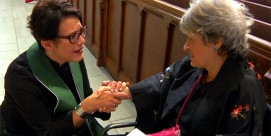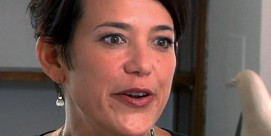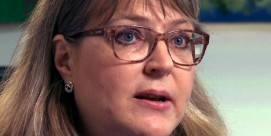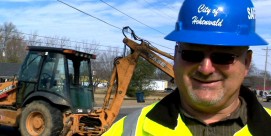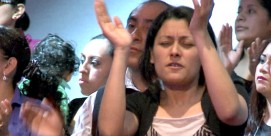In This Episode << SLIDE LEFT TO SEE ADDITIONAL SEGMENTS
Rev. Dr. Brad Braxton Extended Interview
Read more of Religion & Ethics NewsWeekly’s May 27, 2009 interview with the Rev. Dr. Brad Braxton, senior minister of the Riverside Church in New York City:
My mom and dad have and continue to have an absolutely indelible significance in my life. When I talk about them what I think about is their living demonstration of integrity. They are a parable of integrity. Integrity for me means the struggle to bring your inner beliefs into connection with your outer behavior, and I saw that so clearly in them. They were people who lived the gospel, and they were people who poured everything they had into the rearing of their children, and so for that, I am forever indebted to them.
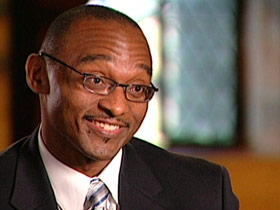
I think I probably started doing some guest speaking as a youth speaker when I was about 13, 14, 15, thereabouts, and officially I announced my call to ministry to my parents when I was a senior in high school, so I was just about to turn 18. It was in January of, I guess, 1987, when I was just about to turn 18 that next month, and as I have shared in lots of interviews, my father said to me, “Son, I will not call you into ministry because I cannot keep you in that call. But if God has called you, I will cast everything that I have in service of you reaching the goal of being the minister God has called you to be.”
Pastoral ministry is a wonderful vocation. The opportunity to guide a community of faith amid its joys and sorrows is a significant and high calling, and it is not the kind of thing that you want to do because it is not only so fulfilling, it is so difficult. As a pastor, you are invited into the most precious spaces of people’s lives, especially those spaces that have to do with the ultimate meaning of life and death, and that’s a difficult space in which to be and to navigate. So it’s not something you quest or set out to do. It’s something that God has to summon you to do and then supply you the resources to faithfully do.
I had the utmost respect for the legacy of the Riverside Church, and there’s quite a story there as it relates to my coming. My first time coming to Riverside Church was in October 2000. I had been invited to preach for New York Presbytery Day. I had recently met Dr. [James] Forbes in another venue, sent a fax to him to let him know I would be in New York. It was in one of our chapels downstairs where I preached, and he graciously came, and so here you had the Reverend Dr. James Forbes sitting on the front row, and at this point I had recently finished my Ph.D., I was a preacher in my early 30s, and to have the pastor of Riverside Church sitting on the front seat listening to me was a remarkable thing. My wife Lazetta was with me that day, and Dr. Forbes generously gave so much of his time. He took us on a tour of the church that day, took us up into his office, and I have shared this moment with him many times, and I don’t know that he recognized how providentially he was speaking that day. But he looked at Lazetta and me and he said, “My sense of you in these few moments that I have been with you is that God is going to be very economical in your life. God is going to move you very quickly to where God needs you to be.” Those were words that Dr. Forbes, the fifth senior minister of this congregation, spoke over me and into my spirit. And some nine years later, I would be his successor and the sixth senior minister of this congregation.
I believe God, as I have said on other occasions, has a big dream for the Riverside Church. We have had all of — I won’t say all, but many of the most significant responses, answers to 20th century dilemmas, and now the question before us is what are the 21st century dilemmas, dilemmas of morality and justice and compassion and reconciliation. What are those questions that are being raised, and how might we provide compelling, godly responses to those questions? And that’s no small task, because the religious landscape has shifted so significantly in the last 25 years. The reasons why people join religious institutions, join congregations [are] changing.
People are coming at religion in a very different way, although religion and spirituality are vibrant phenomena in the early 21st century across the world, certainly in North America. So it’s a vibrant time, it’s an exciting time to do this work, but we’ve got to recognize that the sheer legacy of Riverside, as noble and venerable as that legacy is, might not be enough to attract people in the 21st century in these neighborhoods to which we’re trying to minister.
What we have to do is to say what constitutes compelling, multicultural worship, worship that takes the best of who we are as diverse communities and lifts that before God. And then we’re going to have to begin to say how do we engage in collaborative economic development? Not the old 20th century paradigm of dispensing out of our largesse, which kind of perpetuates colonial myths, but working with people, in this case working with the urban poor. How do we work with the urban poor and learn lessons from the urban poor? One of the things I have said to the membership often is can we find ourselves comfortably in a posture of learning? To be a learner means to be humble, to stay low enough to the ground to say we not only have something to give to the community, the country, perhaps the world; we have so much to learn from communities, the country, and the world.
One of the things I think we should begin to look at is how do we address preventable dilemmas. So one example that I’ve been using a lot in sermons and teaching moments is many people in urban communities suffer from preventable diseases. Diabetes can be prevented by healthy food choices. So what would it look like for the Riverside Church to say we’re going to collaborate with a number of other justice agencies, congregations in this community, to bring better food choices, whole food grocery stores into upper Manhattan? Something really substantive and on the ground I think would make a difference.
The second thing that I’m very interested in is the ways in which we can begin to work with youth in our neighborhood to offer them life-affirming options. And when I think of the youth, I’m thinking especially of the gangs. What would it look like for us to take the gospel and say the gospel and gun violence don’t go together? The gospel says that you should choose life, not death. So how can we help you as gang members use your considerable street smarts to turn your entrepreneurial impulses to the good?
We need to ramp up the emphasis and to suggest that at this moment in time we have to say a life-affirming word to the twenty-somethings, the thirty-somethings, and the teens, that we must begin to invest in new ways, and I think so often, particularly with institutional churches, it’s easy to begin to look so much in other directions that you forget to look backwards as well, to that generation that’s coming behind you and say what are our responsibilities to those, as well? So I’ve been saying a lot to the congregation, “What does it look like to take seriously those who are 30 and under?” And that does not mean we don’t continue to love, provide services for, care for those who are 40, 50, 70, 80. But it means to take seriously there are generations behind us who are now asking, “How are you going to leave the world better for us?”
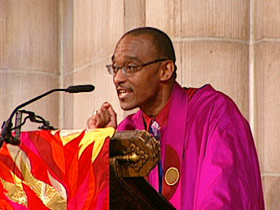
As a pastor, many of these concerns that have arisen are rooted in fear. As I listen to the concerns that have been raised about me, it does not cause me a sense of unrest. A pastor says, “I’m called to help people appropriately deal with their fear.” And one of the things I’ve been saying is a profound justice issue is how a congregation deals with itself. The first public of a congregation is the congregation. So one of my leadership principles is “both/and.” I say this repeatedly in meetings and leadership meetings with staff. We can be a “both/and” church. I’m a “both/and” thinker and leader. That is to say, we can both be concerned about justice and injustice outside of this community and be concerned about justice and injustice inside this community. And I think that sometimes causes people to be fearful, because I would contend that some of the most difficult justice work is not the justice work 5,000 miles around the globe, but it’s the justice work that occurs in the business meeting and right here in our own life as a worshipping and serving community. It requires more of us sometimes to make those justice commitments, and I think some of these concerns may be rooted in the fear of a new kind of commitment that the gospel may be calling us to.
Serving as the second African-American minister in the great history of this congregation, I’m obviously dealing with, as did Dr. Forbes, some of the issues of what it means to guide an institution of this magnitude when this institution, like the United States of America, is still wrestling not only with the residue of racism, but is still wrestling with the great hold that racism has on this country. I think one of the great mistakes of the current moment is to make too much of the election of President Obama as it relates to race relations. It is a marvelous step forward, but it is only a first step forward in some meaningful sense. As one of my colleagues has suggested, given now that the symbol of power at the national level is in the hands of an African American, it might be the first time in our country’s history that we can really have a sophisticated conversation about race relations.
There were inaccuracies in the reporting [about my compensation] that I think created a kind of additional sensationalism to the story. And the second thing I guess that I would say is that what my family and I were simply trying to do was to respond to a significant calling and one that had significant burdens and liabilities associated with it and when we negotiated with the congregation, we fundamentally asked for a compensation package that would allow us more or less to be made whole. That is to say, we did have a comfortable, middle-class life that was afforded to us by virtue of me being a tenured university professor. And part of the story, as I have shared sometimes with the congregation, is the notion of what it means to come from a background like I did, where my father -– I think his salary was $15,000 a year when he retired, and to start out, as my wife and I did, in debt, like many young couples do, and sacrifice and delay having children and struggle, as many middle-class Americans do, and reach a modicum of comfort, and we simply asked for that comfort, more or less, to be met. And I think what’s so fascinating is, where are the conversations that we could have had about why in fact real estate is so expensive in Manhattan, and the kinds of persons who are living extremely well-off? Not focusing on me, but saying, “Why does it cost ten, eleven, twelve thousand dollars to have a certain quality of life in a city like New York?” Where are the justice conversations there? And the other thing that I say was not really addressed was that the congregation and I were trying to sort out how to make it possible for me as senior minister and all my successors after me to have a home, right? It is not unthinkable in nonprofit institutions that the chief executive, as it were, in this case the senior minister, would be provided housing, given the exorbitant amount of money that it costs to live, and the congregation’s desire that I would live on the Upper West Side of Manhattan. So there’re all kinds of factors that went into it. The fact that number one, my family and I had struggled and sacrificed to maintain a certain standard of living, and all we said was, “Can we have a modicum of that to come and serve,” because that provides us a sanctuary. As one of my colleagues said, given the history of a church like Riverside, which is incredibly glorious but also has an underside, this is a place where my last three predecessors, at least, have struggled in one way or another that at some point, pastors who accept callings for difficult congregations might need to have some combat pay.
There’s a burden that comes with this, and all my wife and I and our daughter were looking for was a sanctuary. Because when you’re on seven days a week, as it were, and you are speaking not only to the congregation, but for larger issues in the country, to have a space where I can have a home study, to have a space where we could have some modicum of comfort was all we were questing for, and I think it was sensationalized in a way that’s very unfortunate, and hopefully these and other interviews will allow us to correct that.
I believe healing is taking place. I also believe that one of the challenges that we have at Riverside, and I think this is endemic to the progressive and liberal movement, is that we are very concerned to preserve people’s rights to dissent and to raise differences of opinion. What often doesn’t emerge in conversations at Riverside and liberal institutions is this: When do we talk about accountability? When do we talk about discipline in the sense that there are some forms of speech, there are some kinds of meanings, there are some moments that should not occur because they are corrosive to the best interests of the community. And I don’t know that liberal and progressive institutions have done that kind of work, to say when are boundaries necessary? I think that’s one of the undersides of the Riverside legacy. As marvelous as that legacy is, we have some work to do internally about the justice boundaries in our own communal life.
In terms of the criticism that we may be moving in a more conservative direction, I just need to say simply for the record I just think that’s patently false, and I think as a pastor, though, it’s born, again, out of fear. What I believe we are actually trying to do in our best moments is to suggest that if in fact we are going to be who we are, that is, a Christian congregation, we must take seriously Jesus and scripture. Those are not non-negotiables for Christian congregations. I think in our worst moments those possibilities have existed and perhaps those things have happened here. So the notion of, for example, beginning what some call an “altar call” -– I refer to it as a time of invitation. We started this in our worship services. But because of some of the fear and maybe the lack of nuanced conversations, there are some who immediately equate a time of invitation with black church conservatism, where many of the new members who have joined have suggested that that invitational period is one of the things, one of the major things that was a catalyst for their joining, because in a large space like our nave, the time of invitation creates a space of intimacy. And so all I do every Sunday after preaching is simply say, “For those of you who want a deeper, more intimate connection with this God of whom we have spoken, feel free to come down these aisles.” And there has been a multicultural response to that time of invitation. But what gets played out often in the media is, “New preacher starts invitation. We are going in a fundamentalist direction.” If you read the body of my work, my most recent published scholarship is a piece that takes on fundamentalism, a piece that has been circulated with the congregation. So I must say as a theologian, it is laughable to me that someone would consider me a fundamentalist. The fundamentalists wouldn’t have me if you wrapped me up in a package. They would not take me. My thinking on scripture, my support of gay marriage, I mean, you roll it out. There is no way, shape, or form that I am a fundamentalist, and I say that with all due respect to Christian sisters and brothers who are fundamentalists. We don’t need any more in-fighting like that, any kind of carping. But the notion that I am a fundamentalist and am taking the Riverside Church in a fundamentalist direction, again, is just patently false. And when you get that kind of dissent rising, those kinds of false perceptions rising, what I say as a pastor is there’s deep fear here. There’s deep fear, and the scriptures teach us that perfect love casts out fear. So amid all of the rancor, much of which I think has been directed to me unfairly, you keep loving, you keep preaching, you keep teaching, you keep serving, and after a while, maybe some of that fear will dissipate.
Number one, we have to say a word about poverty. I don’t know that in my lifetime that we will be able to eradicate global poverty, but I think we can significantly lessen it. So what would it look like to significantly deal with poverty, not only on the global stage, but again, right here in the 25 blocks in either direction from our congregation? Number two, I think there are still significant inroads that we need to make as it relates to racism and various communities’ feeling that they have a superior cultural narrative. You see, one of the difficulties of racism is that our conversation about it, again, is such a low level. It lacks such nuance and sophistication. It is not about individual acts of racism. It’s about the way in which racial myths of superiority have actually infected the very civilization’s narratives. And so what would it look like when you begin to talk about the narratives of the culture and the ways in which they are skewed in one direction? We still have an incredible fascination with Europe, right? Something is well-made it’s European-made, right? Just the very notion of Europe bespeaks certain things. What about the Southern hemisphere, the continents in the Southern hemisphere? How do we view them? I think those kinds of things, that takes some real gut-wrenching work, and I think we need to speak to that.
I would say as well this is a time to think seriously about religious pluralism. We just had a marvelous service here at Riverside. I preached a sermon on religious pluralism, and again, here’s a place where people say I’m a fundamentalist. I just preached a sermon from the Riverside Church clearly anchoring myself as a Christian pastor, but saying that in Jesus I have all the God I can stand, but I may not have all the God there is. I’m completely convinced that God has manifested God’s self in wonderful other ways in the great traditions around the world, religious traditions around the world. So I think we need to begin to say how can we get along in the midst of our different religious traditions? So if we take seriously poverty, lessening it, really dealing with the civilization racism, the unconscious racism that exists in our country, and then trying to figure out how the great religious traditions can all get along in a better way, that’s a lifetime’s agenda right there.
I think the responsibility of any religious community and certainly the Riverside Church, given our legacy, is to be an authentic purveyor of hope. Not optimism, but hope, hope that is rooted in the transcendent, I may say hope that’s rooted in God. Hope that does not stick its head in the sand. Hope that is willing to sweat. I once talked about a faith that’s willing to sweat. Hope that is willing to do the difficult work, some of which I’ve outlined just a moment ago. But hope that recognizes that we will be our best selves if we ultimately surrender to powers of goodness that are beyond us. God wants something more for us. God is able to dream a bigger dream for us than we can dream for ourselves. And so part of it is a willingness to work, to sweat, but also a willingness to open ourselves up to power that comes from beyond us. And I think our country is very ready for that. Indeed, the inauguration of President Obama -– if you watched it, it was a profound example of communities coming together questing for something larger than themselves. Our country is ready for something transcendent, something that really speaks to what it means to live for something that is good, that is beyond your own self-interest.
I stand firmly in the role of those who want to be in league with the prophetic spirit. Pardon that circumlocution. Part of what I’ve taught students who have worked with me over the years is that one should be very careful about referring to oneself as a prophet. That’s very dangerous, and it’s utterly presumptuous, because often you do not know if your life has been prophetic until years after, and quite often after you’re dead communities will say you’re prophetic. But you try to offer your life as one that is in league with or hospitable to the prophetic spirit dropping on you and resting upon you. And when I speak of the prophetic spirit, what I mean is not only the common line that places like Riverside, progressive institutions use, and that is speaking truth to power, but the prophetic also does what Kathleen Cleaver said. She says in order to speak truth to power, you have to know what the truth is. And I think so often, you know, prophetic speech is just this [shaking finger] as opposed to opening yourself up and saying what is the truth in the first place? And the prophetic spirit is one that is also comfortable with provocation. One of the roles of the prophet, of the prophetic spirit is to provoke, to agitate. We must remember that Jesus of Nazareth did not die of old age. He was executed in his mid-30s by the government.
When truth is spoken in a way that is compassionate, it liberates people. Now there are times when truth can be a bludgeon. But I think truth in its best moments, compassionately uttered, liberates people. One of the phrases I often say is truth spoken in love never violates a person’s freedom. It liberates, it emancipates. That’s why I think the prophetic spirit is one that seeks to speak the truth in compassionate, loving ways such that people, communities, maybe even countries can be emancipated to be their best selves.
What I see happening is this congregation passionately and lovingly proclaiming a gospel to any who will receive it. As Jesus would often say, “Let those who have ears to hear, hear.” The gospel will be preached in a way that is passionate and loving, and whosoever — we have a “whosoever will” gospel at the Riverside Church.
I think we need to tether religiosity or religion and spirituality in some ways that maybe in the public discourse they’re not being tethered or connected. I worry at times about a spirituality that may not be also looking for religious commitment and discipline. Again, speaking as a Christian pastor, Jesus calls us to be disciples, and etymologically there is a connection between disciple and discipline. Sometimes spirituality in the public discourse just kind of means whatever it is I feel at any moment that might lead to my self-gratification. Spirituality, first and foremost, and I learned this from a Benedictine monk, is related to the Latin word spiritus, breath. So spirituality means where does my breath come from and where is my breath taking me? So spirituality is about personal and communal accountability for the life force in me, and I think we need some new conversations among all our generations to say spirituality is not just an individual thing. It’s about your stewardship to broader communities and ultimately to God.
When I think about being a progressive evangelical what I’m trying to suggest, first of all, is that all Christian congregations are evangelical. That is, we are deeply concerned with the gospel, and in the public discourse the term “evangelical” has been so defined by and connected to the conservative wing of the tradition that we have forgotten that there are progressive people who are concerned about the gospel as well. So what does it mean to talk about the meaning and message of Jesus and still be open to pro-choice, to be open to saying gun violence must cease and we must take on the NRA, to be open to saying the gospel compels me to say we cannot use the Bible to justify war, as was done in 2003, unfortunately, by many of my Christian brothers and sisters? We cannot use the Bible as a weapon of warfare to exclude our gay brothers and our lesbian sisters from full fellowship in the body of Christ, so to be concerned about the gospel, but concerned in a way that says God’s revelation might be moving forward through history, that is to say, revelation is progressive. It’s not static. It doesn’t always look backward. Sometimes the truth is ahead of us. That’s what I think it means to be a progressive evangelical -– being concerned about the gospel, but in a forward-looking way.


